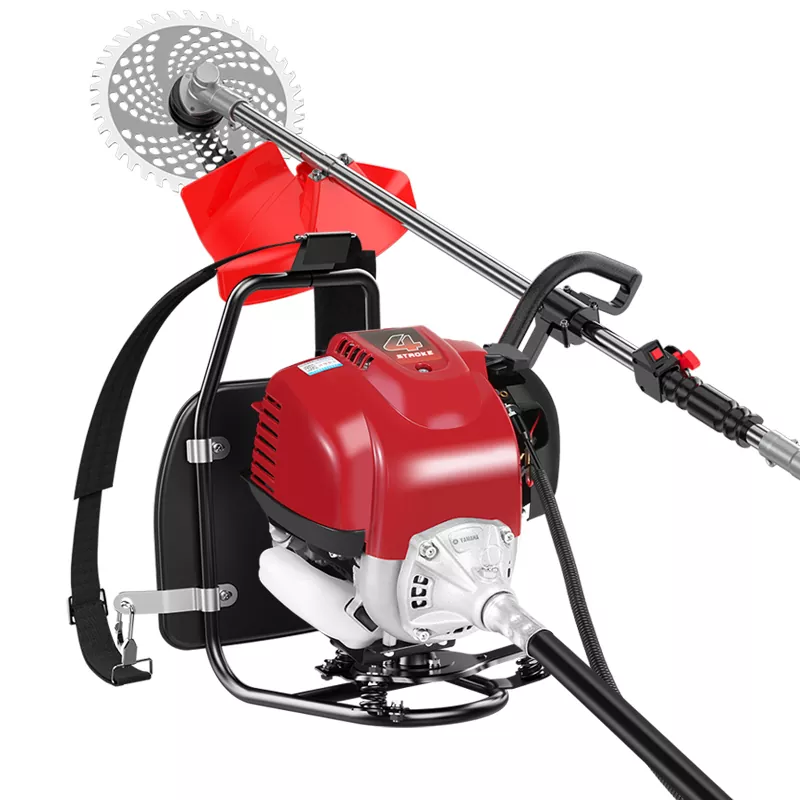Do electric lawn mowers last longer than gas?
In the garden tool market, the difference in service life between electric lawn mowers and gasoline lawn mowers has always been the focus of users. In fact, the durability of the two is significantly affected by the power system, the use environment and the maintenance method. Only by scientifically analyzing the difference in the life of core components can we better match the use needs.

Power system: structural complexity determines the basic life
The motor drive system (brushless motor + controller) of the electric lawn mower has a simple structure, and the moving parts are only the rotor and bearings, without complex mechanical transmission. The design life of a high-quality brushless motor can reach more than 2000 hours, and the bearing adopts a double-sided sealing structure (protection level IP65), and the wear rate in a dusty environment is 70% lower than that of an open bearing. Calculated as 2 hours of use per week, the motor part can run stably for 15-20 years.
The internal combustion engine (single cylinder four-stroke) of a gasoline lawn mower contains more than 30 moving parts such as pistons, valves, spark plugs, etc., and faces high temperature (cylinder temperature reaches 200℃) and high pressure (compression ratio 8:1-10:1) during operation. The wear rate of the piston ring increases with the use time, and the power usually decreases after 1000 hours. If it is not properly maintained (such as untimely oil replacement), the life span may be shortened to 500 hours, and the basic life span is only 1/2 of that of the electric model.
Vulnerable parts: wear rate affects actual durability
The blades and batteries of electric lawn mowers are the main vulnerable parts. High carbon steel blades (hardness HRC50-55) need to be sharpened every 50 hours when cutting weeds, and the overall replacement cycle is about 500 hours; the lithium battery (capacity 40-80Ah) has a cycle life of more than 500 times, and can last for 3-5 years if used for 1 hour a day, and the replacement cost is about 20%-30% of the whole machine.
Gasoline lawn mowers have more vulnerable parts: the cumulative replacement cost of spark plugs (life 200 hours), air filters (need to be cleaned every 50 hours), and fuel filters (replaced annually) is 3 times that of electric models. In addition, the carburetor is prone to clogging due to fuel volatilization. Long-term storage (more than 3 months) requires draining the fuel, otherwise it may cause starting failures and increase maintenance difficulties.
Environmental adaptability: life performance under extreme conditions
In humid environments, the fully sealed motor (protection level IPX4) of electric lawn mowers is more durable than gasoline models. If water enters the circuit system of a gasoline lawn mower, it may cause ignition failure, while the controller of the electric model has overcurrent and overvoltage protection, and the failure rate is reduced by 60% in rain splashing scenes.
Dusty sites (such as unpaved courtyards) are challenging for both, but the brushless motor of the electric lawn mower adopts a dust-proof fan design, which increases the air intake by 30% compared with traditional motors, and dissipates heat more efficiently. After working continuously for 4 hours, the body temperature is 25℃ lower than that of the gasoline model, which effectively delays the aging of components.
Maintenance cost: maintenance frequency affects actual lifespan
The maintenance of an electric lawn mower only requires regular cleaning of the blades and checking the battery power, with an annual maintenance cost of about 50 yuan (including blade grinding and battery calibration). If a lithium battery model is used, it can even achieve "zero maintenance start", avoiding the tedious steps of gasoline models such as oil changes (once every 25 hours) and spark plug inspections.
The average annual maintenance cost of a gasoline lawn mower is about 200-300 yuan (including replacement of engine oil, filter element, and spark plug). If maintenance is neglected (such as insufficient engine oil), it may lead to serious faults such as cylinder pulling and explosion, directly shortening the life of the whole machine by more than 50%. The survey shows that 70% of gasoline lawn mowers are scrapped prematurely due to improper maintenance rather than natural aging of core components.
Comprehensive life comparison: different scenarios have different results
In the home user scenario (1-2 hours of use per week, maintenance once a year), the actual life of the electric lawn mower (8-12 years) generally exceeds that of gasoline models (5-8 years), especially lithium battery models due to simple maintenance, and the life advantage is more obvious.
In commercial scenarios (4-6 hours of use per day, high-frequency maintenance), the life of high-end gasoline lawn mowers (equipped with alloy cylinders) can reach 8-10 years, which is close to the comprehensive durability of electric models (batteries need to be replaced every 3 years), but the replacement cost of electric models is lower (battery replacement costs are about 1/3 of engine overhaul).
In general, electric lawn mowers have a longer actual service life in regular use scenarios due to their simple structure and convenient maintenance. They are especially suitable for home users who value peace of mind and durability; gasoline lawn mowers are still irreplaceable in high-intensity, no-power scenarios, and scientific maintenance can maximize their service life.
























